#after embryo transfer day by day symptoms
Text
How many days after egg retrieval is embryo transfer?
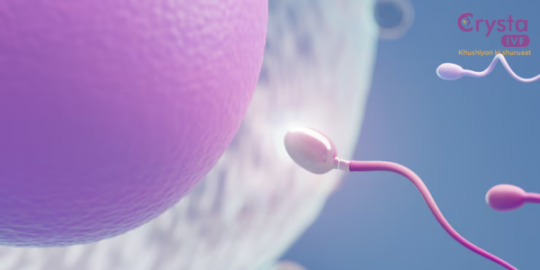
Egg retrieval went smoothly, and now you're in the exciting (and maybe a little anxious) two-week wait after embryo transfer! Wondering what "positive signs" might look like? Let's understand:
Remember: Everybody is different, and there's no one-size-fits-all list of pregnancy symptoms after embryo transfer. Some women might experience a few early signs, while others won't feel anything at all until a positive pregnancy test.
But wait, there are a few things to keep in mind:
Implantation Dip: A dip in body temperature around 6–10 days after transfer can sometimes occur during implantation when the embryo burrows into the uterine lining.
Mood Swings and Cramping: Similar to early pregnancy symptoms, some women experience mild cramping, bloating, or mood swings after transfer. But these can also be caused by hormonal imbalances from the medications used during IVF.
Here's the Golden Rule: Don't overanalyze every twinge or feeling. The two-week wait is a marathon, not a sprint. Focus on staying positive and healthy!
Positive signs after transfer often come in the form of a positive pregnancy test around 10–12 days after transfer. That's the real gold standard!
Top Tip: Resist the urge to take a test too early. Home pregnancy tests might not be accurate before implantation has occurred.
Remember, patience is key! Stay positive, listen to your body, and celebrate small victories. And of course, follow your doctor's instructions for post-transfer care. Here's to a successful transfer and a happy journey ahead!
#positive signs after embryo transfer#sex night before embryo transfer#embryo transfer#after embryo transfer day by day symptoms
0 notes
Text
Best IVF Centre In Delhi
Symptoms of IVF Pregnancy
Many prospective mothers watch for certain signals to see whether they indicate a successful embryo transfer. During the two-week interval between your frozen embryo transfer and a pregnancy test, you may have menstruation-like symptoms. Some of these signs and symptoms of IVF pregnancy include:
1. Bleeding or spotting
The first symptom of pregnancy is usually light bleeding or spotting. It’s possible that spotting in your underwear or on toilet paper when you wipe indicates implantation, which signifies the embryo has implanted into the uterine wall lining. Some spotting or bleeding a week after embryo transfer, according to Mukherjee, could be a favorable sign. Unfortunately, he continues, bleeding is such a distressing symptom that it fails to reassure many individuals. Furthermore, spotting is normal when using hormone drugs like progesterone for the first two weeks following the embryo transfer. Most likely, your doctor would recommend that you continue taking progesterone to assist your body create the same quantities of hormones as it did during the first few weeks of pregnancy, which means that spotting may or may not indicate a successful embryo transfer.
2. Cramping
One of the first indicators that “Aunt Flow” is approaching is cramming. It could also indicate that an embryo transfer went well. However, before you run to the store for a pregnancy test, keep in mind that mild discomfort could be caused by the progesterone you’re taking during the 2-week wait, according to the National Infertility Association. Mild cramping might also occur shortly after any pelvic operation in some persons.
3. Sore breasts
Sore breasts are a common early indicator of pregnancy for some women. This could be an indication of a successful embryo transfer if your breasts are swollen or sore to the touch and ache when you bump them. Breast discomfort is caused by pregnant hormones, according to Kecia Gaither, MD, MPH, FACOG, an OB-GYN and director of perinatal services at NYC Health + Hospitals. However, aching breasts could be a side effect of the hormone medicine you’re receiving for the next two weeks. Breast soreness is also reported to be caused by injectable and oral progesterone.
4. Tiredness or fatigue
From day one through birth (and beyond! ), feeling tired and exhausted seems to be a normal component of pregnancy. When your progesterone levels rise, you may feel particularly tired at first. In general, most people will feel exhausted around the time their period is due. This could be a sign of a successful embryo transfer, but it could also be a side effect of the fertility drugs you’re taking. The most common reason of exhaustion is increased progesterone levels, which can occur as a result of pregnancy or drugs prescribed by your doctor.
5. Nausea
Morning sickness or nausea usually begins in the second month of pregnancy, so it’s not a symptom you’ll feel in the two weeks after an embryo transfer. Many women who experience this terrible symptom report feeling ill to their stomach two weeks after their period is missed. If you do experience nausea or vomiting throughout the 2-week period, keep track of it — particularly if it gets frequent — and consult your doctor.
6. Bloating
The increased bloat around your stomach can be attributed to an increase in progesterone levels. When this hormone spikes, like it happens when you’re pregnant or using fertility drugs, it might cause your digestive system to slow down and make you feel bloated. This can happen before your period, if you’re pregnant, or when you’re taking progesterone or other medicines during IVF or after an embryo transfer.
7. Changes in discharge
You may notice changes in vaginal discharge that have nothing to do with a positive pregnancy test if your doctor prescribes progesterone in a vaginal preparation (suppositories, gel, or vaginal tablets) to use during the 2-week wait. Using vaginal capsules or suppositories can cause burning, irritation, discharge, and yeast infections. Increased vaginal discharge can potentially be an indication of impending pregnancy. During the early weeks of pregnancy, you may notice a thin, white, mild-smelling discharge if the changes are the result of a successful embryo transfer (and eventually, a positive pregnancy test).
8. Increased need to pee
Trips to the restroom late at night and a greater need for pit stops could be signs of early pregnancy. Before they miss a period, some women may sense an urge to urinate more frequently. However, this is more than likely another symptom you’ll notice after missing a period.
A rise in the pregnancy hormone HCG, as well as a spike in progesterone, causes frequent trips to the bathroom. The increased desire to pee is due to the excess blood in your body if the embryo transfer was successful.
We at Pride IVF Centre are one of the best IVF Centre in Delhi. Our mission is to continually improve the quality of reproductive science provided to society, to foster the participation of infertility consultants, to recognise the value and contributions of our employees, and to provide innovative health solutions to meet individual and challenging healthcare needs. To provide total medical services and the highest quality tertiary (super-specialty) care in a healthy environment where we enjoy serving patients, where meeting today’s healthcare challenge of complex medical needs is viewed as a defining proficiency, and where quality and safety of cares are always a priority.
>>
2 notes
·
View notes
Text
0 notes
Text
Exploring IVF Cost in Gurgaon – Finding the Best IVF Doctor in Gurgaon

IVF (in vitro fertilization) treatment helps couples facing severe infertility issues. IVF takes place in a laboratory and the only purpose of IVF is to help couples to deliver a healthy biological baby. Infertility is a worldwide issue making the lives of couples worse as they are not able to conceive. A happy family needs a healthy child to carry on the bloodline. But infertile couples opt for an adoption and compromise with infertility issues for the rest of their lives.
Infertility issues can be treated with several ART methods including the IVF method. Countless fertility centres are offering top-notch treatment with the best IVF doctors in Gurgaon. Several tests, health check-ups, and examinations are involved during the IVF treatment, which will increase the total cost of IVF in Gurgaon. IVF cost in Gurgaon is much more affordable than in other cities or countries, making it a perfect destination for IVF procedures. IVF treatment cost in Gurgaon is between INR 1,50,000 and INR 3,00,000.
What procedures are involved in IVF?
IVF is an ART method completed in five to six steps with a high success rate. IVF cost in Gurgaon involves various procedures including blood and ultrasound tests to get an idea about the health of the intended parents. These tests and examinations help to find any genetic or hereditary diseases in the couples. If they are struggling with any genetic or hereditary diseases, then in that case, these tests and examinations prevent the transfer of diseases to the unborn baby. These tests also help in finding the health of the gametes of the couples. If needed, the doctor will assist them with donor eggs or sperm.
The next step starts when the doctor gives hormonal medicines to stimulate the ovaries. The doctor will inject hormonal injection which helps the ovaries to produce mature eggs. Once enough mature eggs are produced, the doctor will collect them from the ovaries of the intended female partner. The doctor will use a device named a catheter and a fine needle to retrieve the eggs from the ovaries. The male partner will provide a semen sample to the doctor for the fertilization procedure. The doctor will combine the male partner`s semen and the female partner`s eggs on a petri dish plate. The ICSI (intracytoplasmic sperm injection) technique will be used to increase the success rate of the IVF treatment. In ICSI, the doctor will inject the sperm into the eggs outside the human body inside a laboratory. These advanced procedures can increase IVF cost in Gurgaon.
The insemination of the eggs and sperm will form healthy embryos. This is called fertilization. Later, the doctor will monitor this fertilized egg for the next 4 to 5 days. This fertilized egg or embryo will be transferred inside the womb of the intended female parent with the help of a catheter and a fine needle. Once, the embryo sticks to the wall of the uterus of the intended female parent, the pregnancy symptoms will be visible. The doctor will do blood and ultrasound tests to confirm pregnancy. After nine months of pregnancy, the female partner will deliver a healthy biological baby with a C-section or normal vaginal delivery.
To whom IVF procedure is recommended?
Couples who are at an advanced age may have poor sperm or egg quality which will affect IVF cost in Gurgaon. An advanced-aged patient will have fewer chances for conception. If a female has irregular ovulation, menstruation cycle, PCOS, PCOD, endometriosis and early menopause will need IVF assistance. The female partner who has blocked, broken or no fallopian tubes cannot conceive a baby and in that scenario, IVF treatment will be recommended. Couples who are facing severe or unexplained infertility issues will need IVF treatment. If a couple is facing genetic or hereditary diseases, they will need the IVF method as it prevents transmission of the diseases to their newborn child.
If a male has a poor quantity or quality of sperm, they might need assistance through IVF. If a couple has faced previous miscarriages, failed pregnancies, and failed IVF cycles or ART methods can look for the best IVF treatment in Gurgaon.
Conclusion-
IVF (in vitro fertilization) is a treatment method offering hope to couples with severe infertility issues. IVF helps infertile couples to conceive a biological baby. IVF treatment involves several steps such as blood and ultrasound tests, egg and sperm retrieval, insemination, fertilization and implantation. Many IVF centers offers quality treatment with the best-skilled doctors and experienced medical staff at an affordable price. An advanced method such as ICSI maximizes the chances of a successful pregnancy. Couples facing issues like blocked fallopian tubes, genetic diseases, and irregular ovulation, can be assisted through several ART methods including the IVF method.
0 notes
Text
What happens after an embryo transfer
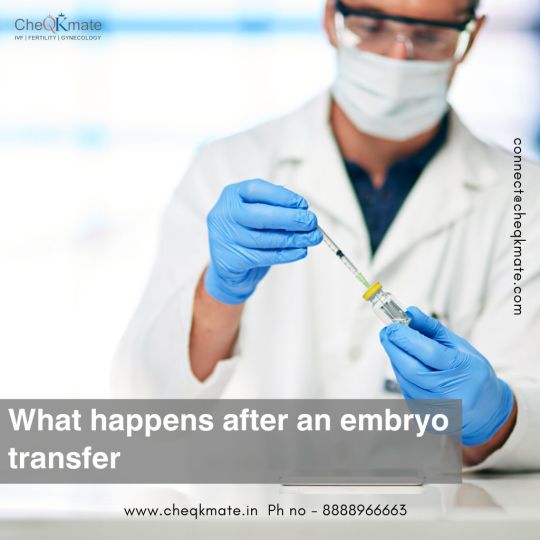
The egg and sperm have had a great time in the incubator. The culture provides them an atmosphere as in the fallopian tube. Be it the light, temperature and the gas concentrations.. Below image shows the development if the embryo outside the body. But the curiosity of knowing what happens after the implantation is magnificent. For sterile symptoms female must undergo fertility test.
After your eggs have been retrieved, time almost stops! Each day feels like a year and your curiosity about the activities in the lab reaches its peak! While you are getting restless, your baby is actually getting its life… Implanting an embryo is no less than an art… It takes immense skill and expertise over the procedure. Your fertility specialist is equally eager to make the transfer a success!
For More Info - https://cheqkmate.in/dr-seema-jain-gynecologist-clinic/what-happens-after-an-embryo-transfer/
0 notes
Text
Lakshmi Fertility Centre
CHRONIC ANOVULATION
Chronic anovulation happens when an egg (ovum) doesn’t release from the ovary during the menstrual cycle. An egg is needed to have a pregnancy. The process of ovulation begins when your hypothalamus (a part of your brain) releases Gonadotropin-Releasing Hormone (GnRH). GnRH causes your pituitary gland (a gland in your brain) to secrete Follicle Stimulating Hormone (FSH) and Luteinizing Hormone (LH). Chronic anovulation is a result of an imbalance of hormones that cause a woman to ovulate and may be part of the condition polycystic ovary syndrome (PCOS). Irregular menstruation can also indicate anovulation, and we have a variety of diagnostic tools to help determine the cause of irregular cycles. It has the following indications to be nursed immediately.
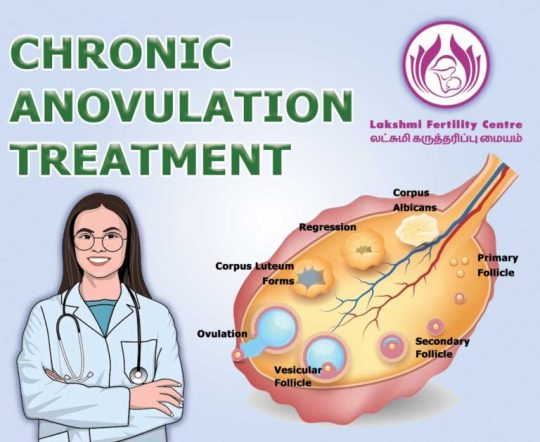
SYMPTOMS OF CHRONIC ANOVULATION:
https://lakshmifertility.com/wp-content/uploads/2023/10/symptoms-anovulation-72-resolution-768x537.jpg
IRREGULAR PERIODS:If the length of time in between your periods keeps changing, it’s considered an irregular period. The average menstrual cycle is 28 days, but changing a couple of days shorter or longer than that should be noted.
HEAVY OR LIGHT PERIODS:A heavy period is defined by losing over 80 ml of blood within your period and/or having a period that lasts longer than seven days. Blood loss of fewer than 20 ml throughout your period is considered a light period.
LACK OF PERIODS:Missing one or more periods without being pregnant could be a sign of anovulation. It is also known as amenorrhea.
LACK OF CERVICAL MUCUS:Right before and during ovulation, you usually have the most vaginal discharge called cervical mucus. It usually looks like raw egg whites. If you don't have this discharge, it is the symptom of anovulation.
IRREGULAR BASAL BODY TEMPERATURE:Your basal body temperature is the actual temperature when you are at rest. It’s usually taken after you wake up and before you’ve done any type of physical movement or activity. Ovulation can cause a slight increase in your basal body temperature.
MEDICATIONS:
Most of the time, the medications used for treating anovulation are fertility drugs.
CLOMIPHENE CITRATE:This medication helps to correct ovulatory irregularities and is a selective estrogen receptor modulator found to be effective in inducing ovulation in nearly 80% of the cases.
HUMAN CHORIONIC GONADOTROPIN INJECTION:This hormone causes your ovary to release an egg. A synthetic form of it can be injected to help treat anovulation. It’s often taken with clomiphene citrate.
FOLLICLE STIMULATING HORMONE INJECTION:If your body isn’t making enough FSH or if the other treatments for anovulation haven’t worked, your healthcare provider may have you get an injection of synthetic FSH to help your ovary release an egg.
GONADOTROPIN-RELEASING HORMONE AGONISTS AND ANTAGONISTS INJECTIONS:An injection of GnRH agonists and antagonists helps to control the levels of luteinizing hormone (LH) your body secretes, which is the most needed one for ovulation.
Lakshmi Fertility Centre:
Lakshmi Fertility Centre is the Best Fertility Centre in Madurai. Lakshmi Fertility Centre Provides the best Gynaecology Service, the best treatmetnt for Infertility Treatment and Obstetric Care. Lakshmi Fertility Centre Offers comprehensive services for the diagnosis and treatment of infertility. Our Assisted Reproductive Technology (ART) program is classified as a foremost In Vitro Fertilization (IVF) and embryo transfer program in Delhi. Lakshmi Fertility Centre is the best Fertility Centre around Madurai, Trichy, Thanjavur, Dindigul and Pudukkottai.
#fertility#fertilization#ivf#ivf specialist#infertility#ivf treatment#fertility centre#womenshealth#ivf hospital#fertility center
0 notes
Text
A Comprehensive Guide to IVF Costs in Argentina
IVF Cost in Argentina
IVF Cost in Argentina is very reasonable, ranging from USD 4000 to USD 4500 at We Care IVF Surrogacy clinic in Argentina. The cost of the fertility treatment in Argentina depends on various factors as mentioned below:
Couple’s age: According to the study, standard IVF treatment is the best choice for couples below 35. After 35, ovarian reserve starts falling in couples. They cannot produce enough eggs and sperm for healthy fertilization, which means they are into a stage where they need high fertility dosage to produce multiple eggs and sperm for fertilization. It increases the cost of IVF in Argentina.
Number of IVF cycles used: If couples use more than one IVF cycle, then the cost of IVF in Argentina increase accordingly.
Weight: Couples going for standard IVF treatment must maintain their ideal body weight as per their body mass index (BMI) to achieve a successful outcome. According to the study, couples having over or under bodyweight need more fertility dosage to produce multiple eggs and sperm for fertilization, increasing the cost of IVF in Argentina.
Lifestyle changes: Couples who consume unhealthy food or drinks require more fertility drug dosage when they plan for standard IVF because due to an unhealthy lifestyle, their fertility is affected. They cannot produce eggs and sperm for fertilization. With the help of fertility drug dosage, couples can produce multiple eggs and sperms; however, it increases the cost of IVF in Argentina.
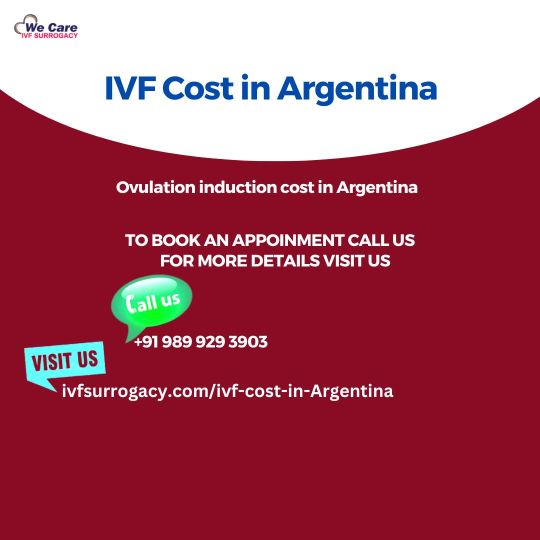
IVF treatment work at We Care IVF Surrogacy in Argentina
IVF treatment consists of six steps that help the couples in conceiving a baby. The following are the five steps:
Egg retrieval: Egg retrieval is a step where fertility experts at We Care IVF Surrogacy collect the eggs from the woman’s ovaries using a hollow needle that passes through the pelvic cavity area under local anaesthesia to reduce discomfort. Some women may experience mild cramping or pain during egg retrieval and take the same care by giving over-the-counter medications prescribed by the experts.
Secure the Sperm: In this step of an IVF treatment in Argentina, the fertility expert fertilizes the woman’s egg with donor or genetic father’s sperm that has been obtained surgically through ejaculation.
Egg fertilization: It is the most crucial part of IVF treatment. The fertility experts at We Care IVF Surrogacy mix the collected eggs and sperms to aid the fertilization process. There are cases where the probability of fertilization is low; in such cases, the expert uses the other technique of fertility treatment that is ICSI. ICSI is a procedure that is used to treat male infertility issues. It is a procedure where fertility experts directly inject a single sperm into each egg to achieve successful fertilization.
Embryo transfer: On the day of embryo transfer, the We Care IVF Surrogacy experts pick the most active and healthy embryo/s to transfer into the woman’s uterus and wait for the pregnancy symptoms.
Pregnancy test: It is the last step of the IVF treatment and will be performed after 14 days of embryo transfer. The fertility experts conduct an ultrasound scan to see a sac in a woman’s ovaries. Once they see a sac and hear the infant’s heartbeat, it indicates a successful pregnancy has occurred and can hand over couples to their local gynaecologist for further treatment.
Argentina fertility rate at We Care IVF Surrogacy
To date, the Argentina fertility rate at We Care IVF Surrogacy clinic for one fresh IVF cycle is around 75 to 85% for women under 35; however, these fertility rates drastically dip to 45 to 55% for women above 35 as her ovarian reserve starts falling and she cannot produce multiple eggs for healthy fertilization.
Still, the Argentina fertility rate is relatively high at We Care IVF Surrogacy compared to other fertility clinics in Argentina. People from different countries are travelling to Argentina for their fertility treatment because they get the highest fertility rates for taking the babies to their home countries.
0 notes
Text
IVF Treatment
In vitro fertilization (IVF) is a complex series of procedures that can help people with infertility conceive a baby. IVF involves fertilizing an egg with sperm outside the body and then transferring the fertilized egg, or embryo, back into the uterus.
IVF surgery is a minor surgical procedure that is used to remove eggs from the ovaries. This is done under anesthesia, so the patient does not feel any pain. The doctor uses a thin needle to aspirate the eggs from the follicles.
Once the eggs have been collected, they are fertilized with sperm in a laboratory dish. The fertilized eggs are then allowed to develop into embryos. After a few days, one or more embryos are transferred back into the uterus.
The success rate of IVF depends on a number of factors, including the age of the woman, the cause of infertility, and the quality of the eggs and sperm. However, overall, IVF has a high success rate, with about 30% of women who undergo IVF becoming pregnant.
IVF surgery step-by-step
Here is a step-by-step overview of the IVF surgery process:
Ovarian stimulation: The first step in IVF is to stimulate the ovaries to produce multiple eggs. This is done using injectable medications or oral medications.
Egg retrieval: Once the eggs have matured, they are retrieved from the ovaries using a thin needle. This is done under anesthesia.
Fertilization: The eggs are then fertilized with sperm in a laboratory dish. This can be done using conventional insemination or intracytoplasmic sperm injection (ICSI).
Embryo culture: The fertilized eggs are then allowed to develop into embryos in a laboratory incubator.
Embryo transfer: One or more embryos are then transferred back into the uterus using a thin catheter.
Implantation: If the embryo implants successfully, pregnancy will occur.
Risks and side effects of IVF surgery
IVF surgery is a generally safe procedure, but there are some risks and side effects associated with it. These include:
Ovarian hyperstimulation syndrome (OHSS): OHSS is a condition that can occur when the ovaries produce too many eggs. Symptoms of OHSS include bloating, abdominal pain, and nausea.
Infection: There is a small risk of infection associated with IVF surgery. This risk is reduced by taking antibiotics before and after the procedure.
Bleeding: There is also a small risk of bleeding associated with IVF surgery. This risk is reduced by using a thin needle to retrieve the eggs.
Multiple pregnancy: IVF can increase the risk of multiple pregnancy, which can be more risky for both the mother and the babies.
IVF surgery success rates
The success rate of IVF depends on a number of factors, including the age of the woman, the cause of infertility, and the quality of the eggs and sperm. However, overall, IVF has a high success rate, with about 30% of women who undergo IVF becoming pregnant.
Who is a good candidate for IVF surgery?
IVF surgery is a good option for couples who have been unable to conceive naturally after one year of trying. It may also be an option for couples who have unexplained infertility, male factor infertility, or female factor infertility such as blocked fallopian tubes or endometriosis.
Conclusion
IVF surgery can be a life-changing procedure for couples who are struggling to conceive. It is important to talk to your doctor to see if IVF is right for you and to discuss the risks and benefits of the procedure.
For the best treatment visit Dr. Mandeep Kaur's Star Fertility
0 notes
Text
In Vitro Fertilization in India
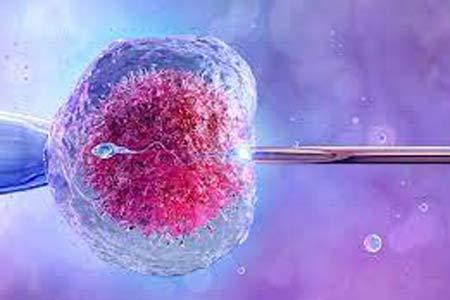
In vitro fertilization (IVF) is a fertility treatment in which eggs are removed from a woman's ovaries and fertilized with sperm in a laboratory. The fertilized eggs, called embryos, are then transferred to the woman's uterus, where they can implant and grow.
IVF is a common treatment for infertility, and it can be used to treat a variety of conditions, including:
Blocked fallopian tubes: The fallopian tubes are the tubes that carry eggs from the ovaries to the uterus. If the fallopian tubes are blocked, eggs cannot reach the uterus and fertilization cannot occur.
Low sperm count: A low sperm count can make it difficult for sperm to fertilize an egg.
Endometriosis: Endometriosis is a condition in which tissue that normally lines the uterus grows outside of the uterus. This can damage the fallopian tubes and make it difficult for eggs to travel to the uterus.
Anovulation: Anovulation is the absence of ovulation, which is the release of an egg from the ovary. If a woman does not ovulate, she cannot become pregnant.
Types of IVF
There are two main types of IVF:
Conventional IVF: This is the most common type of IVF. In conventional IVF, the eggs are removed from the woman's ovaries and fertilized with sperm in a laboratory. The fertilized eggs are then transferred to the woman's uterus.
ICSI: ICSI stands for intracytoplasmic sperm injection. In ICSI, a single sperm is injected directly into an egg. This is a more specialized type of IVF that is often used when the man has a low sperm count or poor sperm quality.
Symptoms
There are no specific symptoms of IVF. However, some women may experience side effects from the medications used to stimulate ovulation, such as bloating, nausea, and fatigue.
Causes
Infertility is the inability to get pregnant after 12 months of regular unprotected sex. There are many causes of infertility, including blocked fallopian tubes, low sperm count, endometriosis, and anovulation.
Diagnosis
If you are having trouble getting pregnant, you should see a doctor to be evaluated for infertility. The doctor will perform a physical examination and ask you about your medical history. You may also need to have tests, such as blood tests, ultrasounds, and semen analysis.
Treatments
If you are diagnosed with infertility, there are a number of treatments available, including IVF. IVF is a successful treatment for many people, but it is not always successful. The success rate of IVF depends on a number of factors, including the woman's age, the man's sperm quality, and the cause of infertility.
Risks
The risks of IVF are relatively low. However, there are some risks associated with the procedure, including:
Ovarian hyperstimulation syndrome (OHSS): OHSS is a rare but serious complication of IVF that can cause fluid to build up in the abdomen and other parts of the body.
Ectopic pregnancy: An ectopic pregnancy is a pregnancy that occurs outside of the uterus. Ectopic pregnancies are a serious complication of IVF, and they can be life-threatening.
Multiple births: IVF can increase the risk of multiple births. Multiple births can be high-risk for both the mother and the babies.
Procedure
The procedure for IVF varies depending on the type of IVF being performed. However, some common steps include:
Stimulation of ovulation: The woman's ovaries are stimulated with medications to produce multiple eggs.
Egg retrieval: The eggs are removed from the woman's ovaries using a needle and a thin tube.
Fertilization: The eggs are fertilized with sperm in a laboratory.
Embryo transfer: The embryos are transferred to the woman's uterus.
Recovery
The recovery time for IVF varies depending on the woman's individual experience. However, most women are able to return to their normal activities within a few days.
Success rate
The success rate of IVF depends on a number of factors, including the woman's age, the man's sperm quality, and the cause of infertility. The overall success rate of IVF is about 35%. However, the success rate is higher for women under the age of 35.
Cost in India
The cost of IVF in India varies depending on the type of IVF being performed, the clinic, and the city. However, IVF is generally more affordable in India than in other countries.
Benefits
IVF can be a successful treatment for infertility, and it can help many people to achieve their dream of having a child.
#In Vitro Fertilization#In Vitro Fertilization in India#In Vitro Fertilization Types#In Vitro Fertilization symptoms#In Vitro Fertilization causes#In Vitro Fertilization Diagnosis#In Vitro Fertilization Success Rate#In Vitro Fertilization Procedure#In Vitro Fertilization Recovery#In Vitro Fertilization Cost#In Vitro Fertilization Cost in India
0 notes
Link
👋 If you're considering undergoing IVF, you might be wondering what to expect from a 3-day transfer. This procedure involves transferring embryos into the uterus three days after fertilization. While it's a relatively common procedure, it's natural to have questions about what symptoms you might experience. 💡 One of the most common symptoms after a 3-day transfer is cramping. This is normal and is caused by the uterus adjusting to the embryo. You might also experience bloating, similar to how you feel before your period. It's important to stay hydrated and rest as much as possible during this time. 💊 You might also experience side effects from the medications you're taking during the IVF process. These can include headaches, nausea, and fatigue. It's important to talk to your doctor about any symptoms you're experiencing to ensure they're normal and not a sign of a complication. Remember to take care of yourself both physically and emotionally during this time.1. Understanding the IVF 3 Day Transfer ProcessDuring the IVF 3 Day Transfer Process, embryos are transferred to the uterus on the third day after fertilization. Here's what you need to know: Embryos are cultured in the lab for 2-3 days before transfer On the third day, the embryos are graded for quality and selected for transfer The transfer is done using a catheter and is usually painless After the transfer, patients are advised to take it easy for a few days It's important to note that not all embryos will survive until Day 3. The ones that do are more likely to result in a successful pregnancy. Patients may experience some mild cramping or spotting after the transfer, but this is normal. It's also important to follow any medication instructions given by your doctor. Overall, the IVF 3 Day Transfer Process can be an emotional rollercoaster, but it's important to stay positive and hopeful. 🌟2. Common Symptoms After an IVF 3 Day TransferAfter an IVF 3 day transfer, it's common to experience some symptoms. Here are some of the most frequent: Cramping: Mild to moderate cramping is normal and can last for a few days. Spotting: Light spotting can occur due to the implantation of the embryo. Bloating: Hormonal changes can cause bloating and discomfort. Breast tenderness: Hormonal changes can also cause breast tenderness and swelling. Fatigue: Feeling tired and exhausted is normal due to the body's response to the treatment. Mood swings: Hormonal changes can cause mood swings and emotional instability. It's important to note that not everyone will experience these symptoms, and some may experience different symptoms altogether. If you're concerned about any symptoms, don't hesitate to contact your doctor. Remember to take care of yourself during this time. Rest, stay hydrated, and avoid strenuous activities. Good luck on your journey to parenthood! 🤞👶3. Physical Changes to Expect During the 3 Day Wait Bloating and abdominal discomfort are common due to the gas produced during fermentation. Cravings for sugary and salty foods may increase as the body adjusts to the absence of alcohol. Headaches and fatigue may occur as the body detoxifies and adjusts to the absence of alcohol. Improved digestion and regular bowel movements are common due to the increased fiber intake from food. Improved skin complexion and reduced inflammation are possible due to the absence of alcohol. Better sleep quality and reduced snoring are possible due to the absence of alcohol's sedative effects. 4. Emotional Symptoms After an IVF 3 Day TransferIt's common to experience . Here are some possible feelings: 💔 Disappointment if the transfer didn't work 😢 Sadness if the process is taking longer than expected 😕 Confusion about what to do next 😡 Frustration with the physical and emotional toll of IVF 😭 Overwhelmed by the uncertainty of the outcome It's important to remember that these emotions are normal and valid. Here are some tips to cope: 💆 Take time for self-care and relaxation 👥 Connect with support groups or loved ones 📝 Journal to express your feelings 🧘 Try mindfulness or meditation 🏋️♀️ Exercise to release stress and boost mood It's also important to communicate with your healthcare provider about any concerns or changes in your emotional state. They can provide resources and support. Remember, everyone's journey is unique and there is no right or wrong way to feel. Be kind to yourself and take it one day at a time.5. Coping Strategies for Managing IVF 3 Day Transfer SymptomsManaging IVF 3 Day Transfer Symptoms can be challenging, but there are coping strategies that can help you get through it. Here are some tips: Stay hydrated by drinking plenty of water Get enough rest and sleep to help your body recover Avoid strenuous activities and exercise Eat a healthy diet to support your body during this time Take prescribed medications as directed by your doctor It's important to listen to your body and take care of yourself during this time. Don't hesitate to reach out to your doctor or support system if you need help. Practice relaxation techniques such as deep breathing or meditation Engage in activities that bring you joy and help you relax Connect with others going through similar experiences for support Consider seeking professional counseling if needed Stay positive and hopeful, and remember that you are not alone Remember to be gentle with yourself and take things one day at a time. This can be a difficult journey, but with the right coping strategies, you can manage IVF 3 Day Transfer Symptoms and come out stronger on the other side. 🌸6. When to Seek Medical Attention for IVF 3 Day Transfer SymptomsIt's normal to experience some symptoms after an IVF 3 day transfer, but when should you seek medical attention? Heavy vaginal bleeding or passing large clots Severe abdominal pain or cramping Fever over 100.4°F (38°C) Difficulty breathing or chest pain If you experience any of these symptoms, contact your doctor immediately. They may indicate a serious complication. Other symptoms, such as mild cramping, bloating, or spotting, are common and usually not a cause for concern. However, if you're unsure or have any questions, don't hesitate to contact your doctor. They can provide reassurance and guidance. Remember to take care of yourself and follow your doctor's instructions. 🌟7. Tips for Supporting Your Body During the 3 Day Wait After IVF TransferAfter an IVF transfer, the 3-day wait can be nerve-wracking. Here are some tips to support your body: Stay hydrated with water and electrolyte drinks. Avoid strenuous exercise, but light walking is encouraged. Get plenty of rest and sleep. Eat a balanced diet with protein, fruits, and vegetables. Avoid alcohol, caffeine, and smoking. Take prescribed medications and supplements as directed. Stay positive and reduce stress with relaxation techniques. Remember, the 3-day wait is crucial for the embryo to implant. Take care of your body and mind during this time. 🌟🧘♀️🍎💧🚶♀️🛌🙏🚫🍷☕️🚭💊 In conclusion, undergoing IVF 3 day transfer can be a rollercoaster of emotions and physical changes. It's important to stay positive and hopeful throughout the process. Remember to take care of yourself, rest, and follow your doctor's instructions. 👍🏼 Don't be alarmed if you experience some symptoms such as cramping, spotting, or bloating. These are common and can be a sign of implantation. However, if you experience severe pain or heavy bleeding, contact your doctor immediately. 👶🏼 Keep in mind that every woman's experience is different, and there is no one-size-fits-all approach. Trust in your body and the medical professionals guiding you. With patience and perseverance, you can increase your chances of a successful pregnancy. https://symptomfinder.com/ivf-3-day-transfer-symptoms-what-to-expect/?_unique_id=6492bac91ca7f
#Uncategorised#embryotransfersymptoms#IVF3daytransfersymptoms#IVFimplantationsymptoms#IVFpregnancysymptoms#IVFsuccesssymptoms#aiomatic_0
0 notes
Text
What is the best fertility centre in Nepal for couple infertility treatment?
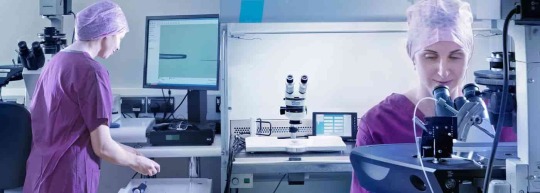
Fertility Centre Nepal is the best centre that treats male and female infertility problems that prevent them from becoming parents. Experts at IVF Centre Nepal have various male and female fertility treatments to help them conceive. These are:
(A) Infertility Treatment for Male Members: Male infertility is now a common problem, and 8 out of 10 male members are dealing with infertility problems. IVF Centre Nepal has various treatment options for male infertility, and these are as follows:
(i) Gamete Intratubal Transfer (GIFT): It is similar to IVF treatment. During this procedure, fertilization occurs naturally, and experts from a fertility centre in Nepal directly place the best-selected sperm into the woman's fallopian tubes.
(ii) Sperm Donor: Sperm Donor is the best fertility procedure to treat male infertility problems like low or poor sperm count, low sperm quality, etc. In this procedure, experts at Fertility Center Nepal select donor sperm and artificially inseminate them with woman eggs in the IVF laboratory. A couple opting for sperm donation as a fertility treatment should speak to their specialist before proceeding.
(iii) Hormonal treatment and drugs: Experts at a fertility centre in Nepal recommend hormone replacement to treat the causes of infertility before suggesting surgery. Hormone replacement is the best fertility procedure that is useful in treating male infertility that occurs due to high or low hormone levels.
(iv) Surgery: Surgery is the last resort recommended by experts when other non-surgical treatments have failed to reverse male fertility. In such cases, a specialist will perform surgery to extract the male sperm using a thin fine needle from the male epididymis, known as percutaneous epididymal sperm aspiration (PESA), or the testicle, known as testicular sperm aspiration (TESA). If these two techniques fail to get enough sperm for insemination, experts at Fertility Center in Nepal will use the latest technique, TESE testicular sperm extraction. After the sperm are extracted, the fertility specialist mixes them with the woman's egg until an embryo is formed. On the day the embryo is developed, the most qualified embryologist selects the healthiest embryo and implants it into the mother's uterus to achieve a successful conception.
(B) Infertility Treatment for Women: Below are some of the best infertility treatments to treat female infertility problems and they are:
(i) IVF: Most fertility experts prefer the first-line treatment before proceeding with other advanced fertility procedures. In this procedure, a specialist collects the genetic parent's eggs and sperm and fertilizes them in an IVF laboratory until an embryo develops. Once the embryo is ready, the embryologist places the created embryo in the mother's uterus and waits for pregnancy symptoms.
(ii) Egg Donation: This is the most commonly used advanced fertility procedure in which experts at a fertility centre in Nepal borrow eggs from young, healthy and fertile women aged 21 to 28 years. Once the eggs are borrowed, a professional fertilize them with sperm from the biological father or a donor to facilitate fertilization. It is the best fertility method for women who cannot produce multiple eggs for fertilization in one attempt. With the help of egg donors, an infertile woman can become pregnant because the fertilized eggs will remain in her womb, and the fertility specialist will continue to monitor the growth and development of the fetus.
(iii) Embryo Donation: Embryo donation is a fertility procedure where couples who have already successfully conceived through a fertility procedure and want to donate their remaining embryo(s) from the first fresh cycle to help other couples who want a child through a fertility procedure.
(iv) Fallopian tube reversal: This is an advanced procedure in which a specialist repositions a woman's fallopian tubes to help her conceive naturally. It is the best fertility procedure recommended by fertility centre Nepal experts for women with burnt tubes. This is a surgical procedure in which an experienced surgeon makes a small incision in the woman's lower pelvic area to operate these tubes. The surgeon uses a microscope and attaches the small tubes with a tiny stitch. After the procedure, women's chances of natural conception will increase. Experts from the IVF Centre Nepal recommend the opposite procedure for women under 40.
(v) Laser-Assisted Hatching: This is unique infertility and advanced technique in which a fertility specialist hatches the eggs from the protective layer and places them directly into the woman's uterus to confirm conception.
(vi) Frozen Embryo Transfer (FET): FET is a procedure in which a professional uses leftover embryos from a couple's previous fertility cycle. The embryologist selects the healthiest embryo and implants it into the woman's uterus, and waits for pregnancy symptoms. According to research, the success of transferring a frozen embryo to a woman's ovaries increases the chance of a successful conception by 2x that of transferring a fresh embryo.
1 note
·
View note
Text
Unlocking the Truth: Is IVF Painful? Get the Facts from ART Fertility Clinic
In recent years, In Vitro Fertilization (IVF) has become an increasingly popular option for couples struggling with infertility. Despite its widespread success, many individuals considering this fertility treatment are apprehensive about one key question: is IVF painful? At ART Fertility Clinics, we understand the concerns surrounding this topic, and we aim to shed light on the facts to alleviate any fears associated with the procedure.
First and foremost, it is crucial to recognize that pain is subjective and can vary from person to person. However, the experienced team of professionals at ART Fertility Clinics takes every measure to ensure your comfort throughout the IVF process. Let's dive deeper into the various stages of IVF and address the pain levels associated with each:
Ovarian Stimulation: During this initial stage, patients receive hormone injections to stimulate the growth and development of multiple eggs within the ovaries. While some individuals may experience mild discomfort, such as bloating or tenderness, these symptoms are typically manageable and temporary. Our skilled medical staff closely monitors your progress to minimize any potential discomfort.
Egg Retrieval: The next step in IVF involves retrieving the mature eggs from the ovaries. This procedure is conducted under anesthesia to ensure a pain-free experience for our patients. Our anesthesiologists prioritize your safety and comfort throughout the process, employing the latest techniques to minimize any potential discomfort.
Fertilization and Embryo Transfer: Once the eggs have been collected, they are fertilized in a laboratory setting. This step does not involve any pain or discomfort for the patient. After a few days, the embryos are transferred into the uterus, which is a quick and minimally invasive procedure, often causing little to no pain.
Waiting Period: Following the embryo transfer, a waiting period ensues during which patients hope for a successful implantation. While this period can be emotionally challenging, it does not involve any physical pain.
It is important to note that any potential discomfort experienced during the IVF process is temporary and fleeting. At ART Fertility Clinics, our compassionate staff is dedicated to providing personalized care and support, ensuring that you feel informed, comfortable, and at ease throughout your IVF journey.
Moreover, it is worth emphasizing that the ultimate goal of IVF is to bring joy and fulfillment to individuals and couples longing for a child. The potential rewards far outweigh any temporary discomfort experienced during the treatment.
To conclude, the question "Is IVF painful?" deserves careful consideration, but it should not deter you from pursuing this transformative fertility treatment. At ART Fertility Clinics, we prioritize your well-being, employing advanced techniques and technologies to minimize any potential discomfort. Our dedicated team will be by your side, guiding you through the entire IVF process with empathy, expertise, and utmost care.
Take the first step towards unlocking the truth and reaching your dreams of parenthood by scheduling a consultation with ART Fertility Clinics. Our experienced professionals are here to provide you with the facts and support you need, empowering you to make informed decisions and embark on your IVF journey with confidence.
Remember, at ART Fertility Clinics, your dreams of having a child are our top priority. Together, we can make them a reality while ensuring your comfort every step of the way.
0 notes
Text
7 Tips For Taking Care Of Yourself After Embryo Transfer
The day of transfer is an exciting part of the IVF process. It’s game day, and everything you’ve done in the weeks leading up to getting ready for the embryo transfer. You’ve taken your meds as prescribed, followed your doctor’s advice and lived a balanced lifestyle. You and your embryo are both ready.
Remember that you and your fitness are the top priority right now and for the next few weeks. Though treating yourself like the glass isn’t appropriate (the embryo won’t fall out!), you can relax and take it easy.
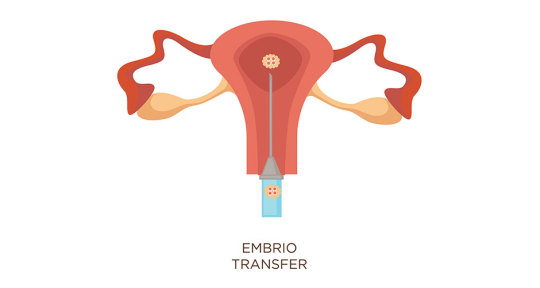
Follow these following tips to make sure you’re taking care of yourself right after the embryo transfer.
On the day of your embryo transfer, your fertility team will go through detailed post-transfer guidelines for you. Spend the next few days pampering yourself. Gentle motions are best, no hard exercise, lifting, twisting, or turning. Here are a few more ways to look after yourself after your embryo transfer:
Relax: The embryo will implant in the next few days, so you must relax and think positive. If at all necessary, take a few days off work. Unplug from the rest of the world’s concerns. You’ll be able to return to daily news, social media, and all of life’s other obligations in due time. A post-transfer walk through the park or beach with your partner is in order. Enjoy your favourite nutritious meal while binge-watching your favourite comedy TV show or the new romantic comedy you’ve been wanting to see.
Continue Taking Your Medicines: Make sure you take your medicines and injections if any as prescribed.
Embrace Healthy Eating: You’ve been following a healthy eating plan in preparation for IVF, and you can keep doing so. After all, if everything goes according to plan, you’ll be carrying a baby in one month and you’ll want to be in great shape. You can take a stroll or walk, continue your office work and eat all kinds of food.
Folic Acid Is a Must: If you haven’t already started taking a folic acid supplement, now is a good time to do so. Supplementing with folic acid has been shown to reduce the risk of neural tube defects, heart defects, and cleft palate. Consult your doctor to determine how much folic acid you need.
Limit Your Exposure to Endocrine Disrupting Chemicals: Of course, you’re cautious about your exposure to something that might endanger your pregnancy or unborn child. Many daily objects contain endocrine-disrupting chemicals. Particularly at this time, try to restrict your exposure to these things (it’s virtually impossible to avoid them entirely).
Don’t Ignore Disturbing Symptoms: Now is the time to pay careful attention to your body and, if anything seems “wrong,” call your doctor right away. It’s most probably nothing, but worrying and stressing over things is never a positive thing.
Avoid the Temptation to Take a Pregnancy Test: You may be tempted to take a pregnancy test. Please do not do so. It will take a few weeks for your body to produce enough HCG, the pregnancy hormone, to confirm your pregnancy. When the “what ifs” start to creep in, it’s time to take action.
THE HARDEST PART IS WAITING.
The next few weeks will be long, but you will get there, just as you did on transfer day. Waiting for the results of your pregnancy test.
After your embryo transfer, taking care of yourself is a great way to start incorporating healthy habits into your life. And, if it hasn’t already, making your wellbeing a top priority is long overdue.
Dr. Deepali Shete IVF Specialist in Kalyani Nagar at Cloud Nine Hospital is highly known for providing the best embryo transfer treatment.
0 notes
Text
What Are The Different Steps To Treat Female Infertility?
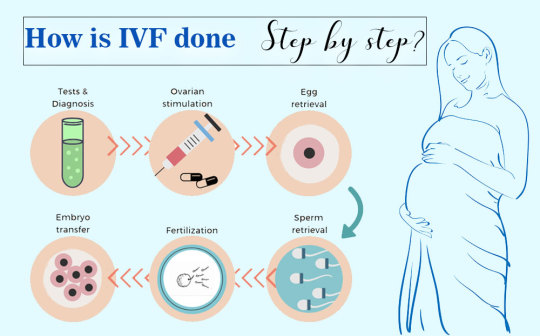
Planning to conceive but worried about female infertility?
Dealing with infertility can be emotionally painful, and seeking treatment options that work is natural. Fortunately, you can get the best treatment recommendation from any infertility specialist in Delhi with years of experience.
It is imperative to understand that infertility can be treated in many different ways. In-vitro fertilisation (IVF) is a common treatment method for most patients, but your infertility specialist can suggest other different steps of treatment, considering your medical history.
Continue reading to learn more about common treatment options for female infertility in India.
Female Infertility Treatment
Medical advancement has perfected female infertility treatment over the years, making it safer with a reduced rate of risks and complications. For women who are having trouble conceiving, these are three common options:
IVF (In Vitro Fertilisation)
IVF is a highly effective fertility treatment for female infertility, recommended by several trusted infertility specialists in Delhi. The eggs are fertilised in a sterile laboratory setting. The resulting embryo is then transferred safely to the woman's uterus, which can implant and develop into a baby. IVF is often recommended to couples struggling with unexplained infertility.
ICSI (Intracytoplasmic Sperm Injection)
ICSI is a form of IVF that injects a single sperm directly into an egg. This technique is used when there are issues with sperm count or motility or when previous IVF cycles have been unsuccessful.
IUI (Intrauterine Insemination)
IUI involves placing sperm directly into the woman's uterus using a catheter. This technique is often recommended for couples with mild symptoms of male infertility or unexplained miscarriages.
Different Steps in IVF Treatment
In-vitro fertilisation, or IVF, is a commonly performed assisted reproductive treatment by renowned infertility specialists in Delhi. Ideally, it is a four-step process that includes controlled ovarian stimulation, egg retrieval, fertilisation in a lab, and followed by embryo transfer to the mother's womb.
Step 1:
The woman undergoing IVF must take daily hormonal injections to develop multiple eggs in each ovary to increase the chances of successful fertilisation. It takes 10 - 12 days, with regular ultrasound monitoring by the embryologist and blood tests. Dr Rhythm Gupta determines the appropriate time for egg retrieval in this stage.
Step 2:
The eggs are retrieved through a simple procedure once they are ready. The eggs are aspirated from the ovary using an ultrasound-guided hollow needle. Your infertility specialists in Delhi perform this procedure under anaesthesia, which is painless. On the same day, the donor sperm is used for the fertilisation process.
Step 3:
In this stage, the insemination of the eggs is performed. The fertilised eggs are kept in the laboratory for observation. This process may take up to 5 days or up to a week until the embryo reaches a more advanced blastocyst stage to increase the success rate.
Step 4:
Embryo transfer is done 3-5 days after egg retrieval and fertilisation. The embryos are transferred into the woman's uterus using a small tube. To increase the success rate of the IVF procedure, the doctor recommends transferring 2-3 embryos at a time.
Step 5:
When the embryo transfer procedure is done by an expert infertility specialist in Delhi, like Dr Rhythm Gupta, the patient is advised to stay in bed for 1-2 hours and can resume their normal activities the next day. IVF patients may experience mild cramping or bloating, but that is temporary. After 2 weeks, your infertility specialist will advise you to take a pregnancy test.
Treat Female Infertility With The Best Infertility Specialist
Various treatment options are available for female infertility. IVF is one of the most commonly performed procedures to help couples start a family, and it has a high success rate. Choose a qualified and experienced infertility specialist in Delhi who has years of experience treating infertility cases for the best outcome of your treatment.
Dr Rhythm Gupta is a renowned gynaecologist and infertility specialist in India. Consult with the expert today to learn more about your treatment options.
0 notes
Text
Best IVF Centre In Delhi
Symptoms of IVF Pregnancy
Many prospective mothers watch for certain signals to see whether they indicate a successful embryo transfer. During the two-week interval between your frozen embryo transfer and a pregnancy test, you may have menstruation-like symptoms. Some of these signs and symptoms of IVF pregnancy include:
1. Bleeding or spotting
The first symptom of pregnancy is usually light bleeding or spotting. It’s possible that spotting in your underwear or on toilet paper when you wipe indicates implantation, which signifies the embryo has implanted into the uterine wall lining. Some spotting or bleeding a week after embryo transfer, according to Mukherjee, could be a favorable sign. Unfortunately, he continues, bleeding is such a distressing symptom that it fails to reassure many individuals. Furthermore, spotting is normal when using hormone drugs like progesterone for the first two weeks following the embryo transfer. Most likely, your doctor would recommend that you continue taking progesterone to assist your body create the same quantities of hormones as it did during the first few weeks of pregnancy, which means that spotting may or may not indicate a successful embryo transfer.
2. Cramping
One of the first indicators that “Aunt Flow” is approaching is cramming. It could also indicate that an embryo transfer went well. However, before you run to the store for a pregnancy test, keep in mind that mild discomfort could be caused by the progesterone you’re taking during the 2-week wait, according to the National Infertility Association. Mild cramping might also occur shortly after any pelvic operation in some persons.
3. Sore breasts
Sore breasts are a common early indicator of pregnancy for some women. This could be an indication of a successful embryo transfer if your breasts are swollen or sore to the touch and ache when you bump them. Breast discomfort is caused by pregnant hormones, according to Kecia Gaither, MD, MPH, FACOG, an OB-GYN and director of perinatal services at NYC Health + Hospitals. However, aching breasts could be a side effect of the hormone medicine you’re receiving for the next two weeks. Breast soreness is also reported to be caused by injectable and oral progesterone.
4. Tiredness or fatigue
From day one through birth (and beyond! ), feeling tired and exhausted seems to be a normal component of pregnancy. When your progesterone levels rise, you may feel particularly tired at first. In general, most people will feel exhausted around the time their period is due. This could be a sign of a successful embryo transfer, but it could also be a side effect of the fertility drugs you’re taking. The most common reason of exhaustion is increased progesterone levels, which can occur as a result of pregnancy or drugs prescribed by your doctor.
5. Nausea
Morning sickness or nausea usually begins in the second month of pregnancy, so it’s not a symptom you’ll feel in the two weeks after an embryo transfer. Many women who experience this terrible symptom report feeling ill to their stomach two weeks after their period is missed. If you do experience nausea or vomiting throughout the 2-week period, keep track of it — particularly if it gets frequent — and consult your doctor.
6. Bloating
The increased bloat around your stomach can be attributed to an increase in progesterone levels. When this hormone spikes, like it happens when you’re pregnant or using fertility drugs, it might cause your digestive system to slow down and make you feel bloated. This can happen before your period, if you’re pregnant, or when you’re taking progesterone or other medicines during IVF or after an embryo transfer.
7. Changes in discharge
You may notice changes in vaginal discharge that have nothing to do with a positive pregnancy test if your doctor prescribes progesterone in a vaginal preparation (suppositories, gel, or vaginal tablets) to use during the 2-week wait. Using vaginal capsules or suppositories can cause burning, irritation, discharge, and yeast infections. Increased vaginal discharge can potentially be an indication of impending pregnancy. During the early weeks of pregnancy, you may notice a thin, white, mild-smelling discharge if the changes are the result of a successful embryo transfer (and eventually, a positive pregnancy test).
8. Increased need to pee
Trips to the restroom late at night and a greater need for pit stops could be signs of early pregnancy. Before they miss a period, some women may sense an urge to urinate more frequently. However, this is more than likely another symptom you’ll notice after missing a period.
A rise in the pregnancy hormone HCG, as well as a spike in progesterone, causes frequent trips to the bathroom. The increased desire to pee is due to the excess blood in your body if the embryo transfer was successful.
We at Pride IVF Centre are one of the best IVF Centre in Delhi. Our mission is to continually improve the quality of reproductive science provided to society, to foster the participation of infertility consultants, to recognize the value and contributions of our employees, and to provide innovative health solutions to meet individual and challenging healthcare needs. To provide total medical services and the highest quality tertiary (super-specialty) care in a healthy environment where we enjoy serving patients, where meeting today’s healthcare challenge of complex medical needs is viewed as a defining proficiency, and where quality and safety of cares are always a priority.
>>
0 notes
Text
How to find the best IVF center in India?
With the advancement in technology, it has become easy to find the best IVF center in India. People can search on the internet, or they can visit the fertility clinic in India & speak to the consultant about the cost of the procedure, qualification & education of the expert, time duration, success rates of operation, etc. Once they complete their homework, the couple can decide which is the best IVF center in India to fulfil their dream of having a baby at a reasonable cost.

While searching for the best IVF center in India, we recommend couples visit at least once at World fertility services, where they get everything from initial consultation to having their baby delivered under one roof.
How do experts at World fertility services perform the IVF process in India?
The experts at World fertility services perform the IVF process in India in the following six steps. These are:

Ovulation induction: It is the first step of an IVF India in which experts give fertility drugs to women, which help their ovaries stimulate. The expert checks the woman's ovaries to notice the timings for egg retrieval. The timing plays an important role when eggs are retrieved because if they are not collected on time, they won't develop appropriately for fertilization.

Egg retrieval: In this step of IVF India, the fertility expert retrieves a woman's eggs from her ovaries using a fine thin needle called a catheter & experts will remove the fluid from follicles under gentle suction using vaginal ultrasound. After completing this process, the expert isolates the eggs from the follicular fluid & places them in a culture dish containing nutrient media. Later on, the expert transfers the eggs into an incubator.
Sperm collection: The fertility clinic in India expert asks the male member to produce his sperm sample on the day the woman's eggs are collected. If sperm are unavailable in the man's ejaculate, an expert extracts them surgically or uses donor sperm to facilitate fertilization.

Egg fertilization: In this step of IVF treatment in India, the fertility expert chooses the most active sperm & combines it with the woman's egg to aid fertilization. The expert keeps the egg & sperm in an incubator. They will keep an eye to ensure that the healthy embryo develops.
Embryo transfer: It is the most critical step of IVF treatment in India where an embryologist at the best IVF center in India picks the most active embryo/s & implants it into the birth mother's uterus & waits for the pregnancy signs and symptoms.
Pregnancy test: On the 14th day after embryo transfer, the couple must visit the best IVF center in India for the pregnancy test. Suppose the results are positive. The expert releases the couples from the clinic to a local obstetrician.
Description

World fertility services are the best IVF center in India which offers reasonable IVF treatment cost in India to individuals whosoever struggling to conceive a baby through natural procedure. The experts at this clinic are highly qualified & experienced fertility professionals who make pregnancies possible for couples of growing ages—people from other countries visiting World fertility services for reasonable cost & highest IVF success rate in India.
Read More: https://worldfertilityservices.com/ivf-india/
0 notes